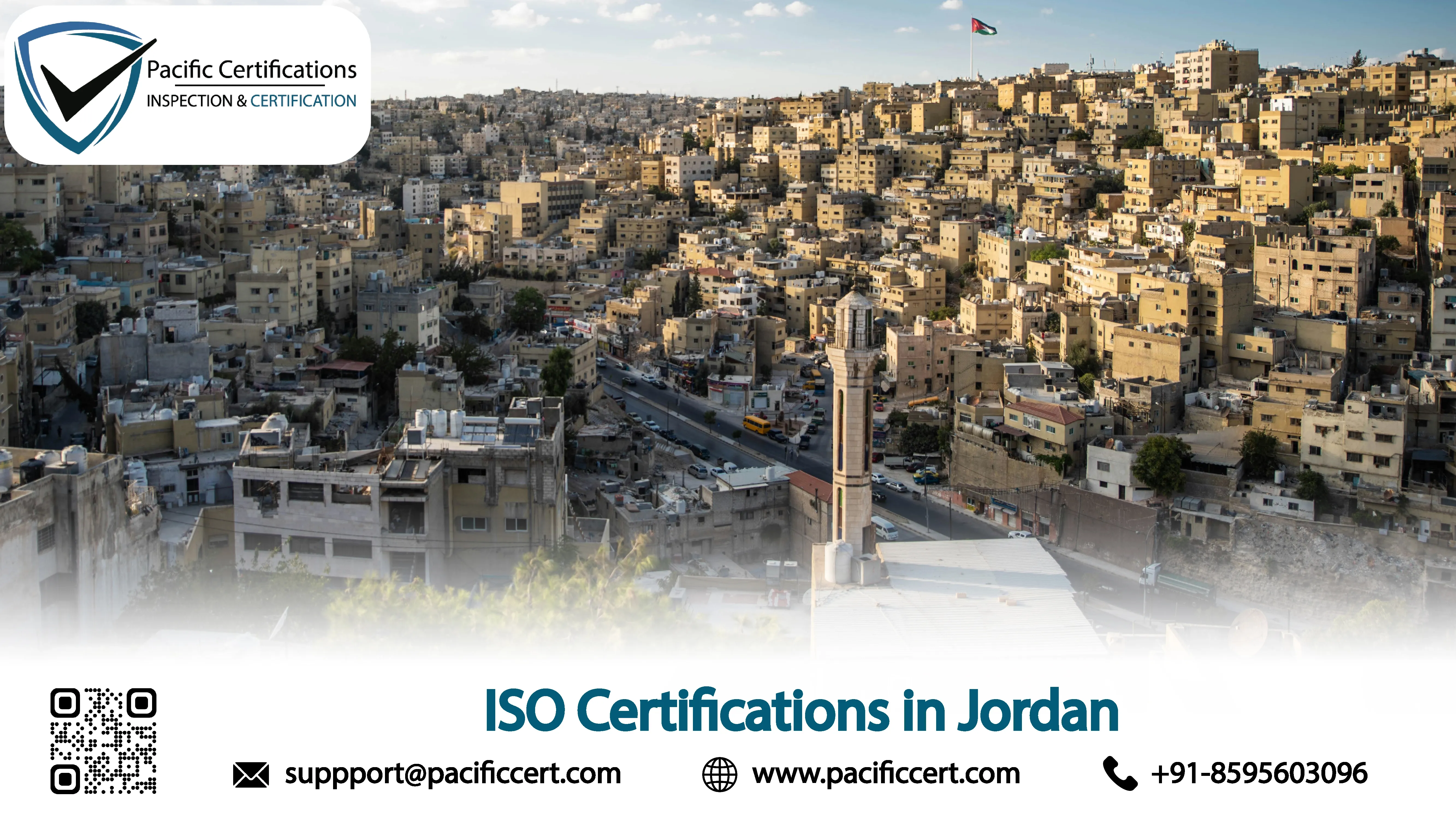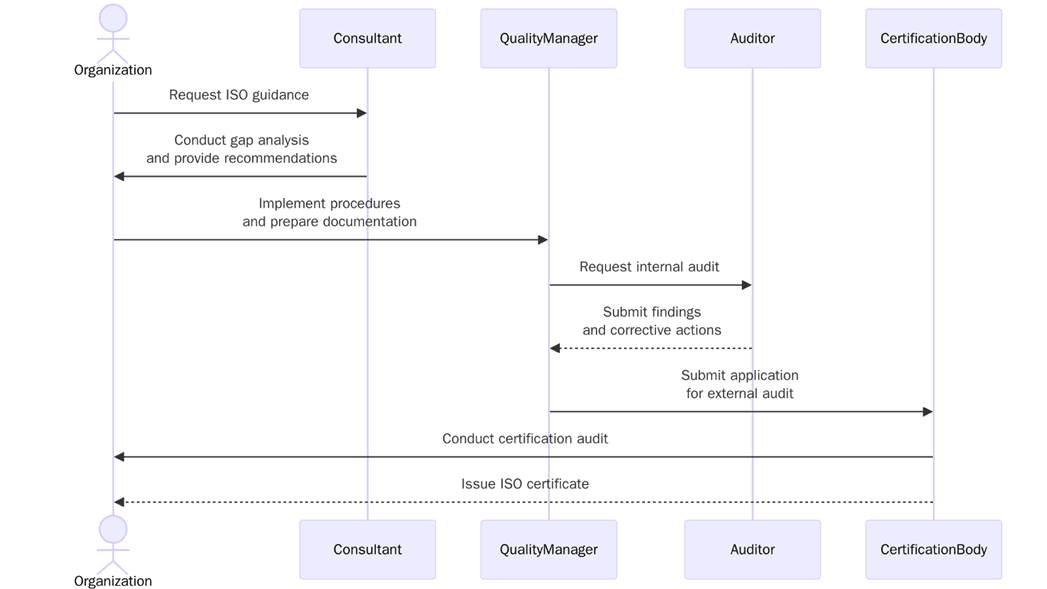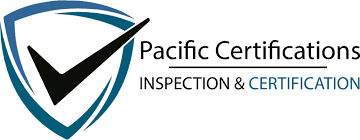ISO Certifications in Jordan, Popular Standards, Requirements and Benefits

Introduction
Jordan’s economy blends downstream mining and fertilizers (phosphate, potash), pharmaceuticals, food processing, construction and infrastructure, logistics anchored by Aqaba, healthcare and laboratories and a rapidly expanding digital/outsourcing scene across Amman, Irbid and Zarqa. By adopting standards such as ISO 9001 (Quality Management), ISO 14001 (Environmental Management) and ISO 45001 (Occupational Health & Safety), companies in Jordan can improve efficiency, reduce waste and earn trust from partners and regulators. For growing sectors like ICT, construction and agrifood, ISO certification has become a practical step toward attracting international clients and competing confidently in global markets. These programs provide verifiable assurance on quality, safety, environment, information security and continuity that buyers and lenders accept across MENA, the EU and global markets.
Contact Pacific Certifications to apply for ISO certification in Jordan, we’ll issue an accreditation-backed proposal with scope, audit days, timelines and a fixed fee.
Economic Context & Industry Overview
Jordan is an import-dependent, services-led economy with strong logistics ties via the Port of Aqaba and a diversified base in mining/chemicals, pharmaceuticals, food and construction. Digital services and outsourcing are strategic priorities, while renewables, especially solar are rising in the power mix. Across these sectors, procurement and regulators increasingly expect auditable management systems for supplier approval, tenders and due diligence.
Why ISO certifications matter in Jordan?
Export-facing manufacturers, EPCs and public projects demand documented controls that reduce defects, incidents and downtime and that withstand buyer or regulator audits. ISO provides a common assurance language to shorten vendor approval, evidence legal compliance, stabilize yield on precision lines, improve site safety and environmental performance and protect information assets and uptime for banks, telecoms and cloud platforms. For food processors and cold-chain operators, HACCP-based standards build confidence with retailers and border inspectors.
Popular ISO Standards in Jordan
Industry focus | Commonly requested standards | Why they matter |
Mining, fertilizers, chemicals | ISO 9001, ISO 14001, ISO 45001, ISO 50001 | Quality discipline, emissions/waste control, safer operations, energy performance |
Construction & infrastructure (incl. rail/roads) | ISO 9001, ISO 14001, ISO 45001 | Quality of works, environmental safeguards, site safety |
Food processing & cold chain | ISO 22000, FSSC 22000, ISO 9001 | HACCP proof, traceability, retailer acceptance |
Pharmaceuticals & healthcare | ISO 9001, ISO 15189, ISO/IEC 17025 | Valid methods, patient trust, lab competence |
ICT, fintech, data centres & cloud | ISO/IEC 27001, ISO 22301, ISO/IEC 20000-1, ISO/IEC 27701 | Security, continuity, IT service quality, privacy governance |
Logistics, warehousing, ports (Aqaba) | ISO 9001, ISO 14001, ISO 45001, ISO 28000 | Turnaround, environmental care, safe handling, chain security |
Utilities & energy | ISO 9001, ISO 14001, ISO 45001, ISO 50001, ISO 22301 | Service reliability, EHS performance, energy efficiency, continuity |
Certification Process in Jordan
Preparation starts with an honest view of how work runs today and how evidence is captured. The aim is to make your system auditable without reinventing daily routines. Below are the steps to consider:
- List products services sites headcount and high-risk processes for clear scope
- Map processes end to end to show handoffs records and responsibilities
- Set policy and measurable objectives linked to customer and legal needs
- Assemble evidence packs for production maintenance labs IT and logistics
- Train process owners keep competence matrices and attendance records current
- Calibrate instruments verify methods and file certificates for quick checks
- Run internal audits that sample high-risk tasks and supplier interfaces
- Hold management review with KPIs audit results complaints legal updates and actions
- Schedule Stage 1 for readiness and Stage 2 for implementation verification align multi-site sampling to risk
- Blend on-site checks with remote interviews where suitable to reduce travel time
- Keep permits licenses and regulatory reports organized for quick verification
What are the requirements of ISO Certifications in Jordan?
Build the system around how work actually runs on lines, sites, clinics and data rooms and align with Jordanian norms so evidence stands up in audits, inspections and buyer reviews; below are the key requirements:

- Scope that matches products/services, processes and sites (single or multi-site).
- Documented system with controlled procedures and records that match practice.
- Risk assessment with controls reflecting real hazards (HACCP, site safety, environmental aspects, privacy/security, energy) and change management.
- Competence matrices and training records for process owners and high-risk roles.
- Internal audits with reports, nonconformities, root-cause actions and verified closures.
- Management review with inputs (KPIs, audits, incidents/complaints, legal updates) and tracked decisions.
- Standard-specific artefacts: HACCP & CCP logs (ISO 22000), Statement of Applicability & risk files (ISO/IEC 27001), HIRA & PTW (ISO 45001), aspect-impact registers & objectives (ISO 14001), energy review & EPIs (ISO 50001).
- Legal/other requirements register with permits, inspections, calibrations, monitoring data and supplier compliance evidence.
Tip: Map controls to Ministry of Environment permits/monitoring, Ministry of Labor/KOSHA equivalent safety rules, JFDA/MA for food/pharma compliance and the Personal Data Protection Law (2023) for privacy; keep calibration certificates, energy/emissions data, cold-chain logs and supplier test reports ready.
What are the benefits of ISO Certifications in Jordan?
Use certification to unlock supplier status with EPCs and manufacturers, pass public procurement checks and stabilise operations across sites; below are the key benefits:

- Faster prequalification in buyer portals and public tenders
- Fewer incidents, defects and unplanned stoppages on lines and projects
- Clear roles and competence paths for critical operations and maintenance
- Traceable data for warranty, claims, ESG and due diligence
- Better supplier control through audits, KPIs and corrective actions
- Measured gains in energy use, waste, emissions, uptime and yield
- Stronger brand signals for regional and international markets
Market Trends
Looking ahead to 2027–2030, two policy-backed forces are set to pull ISO adoption in Jordan.Digital economy scale-up: The government’s Economic Modernization Vision and National Digital Transformation Strategy keep prioritizing secure infrastructure, trusted digital identity, and high-reliability e-government services. As fintech, cloud and public platforms harden their SLAs, organizations will lean more on ISO/IEC 27001 (information security), ISO 22301 (business continuity), and ISO/IEC 20000-1 (IT service management) to evidence control, incident readiness, and service quality. (source: Open Knowledge Repository) The second on is energy transition & efficiency:With officials reiterating ambitions for renewables to supply around 50% of electricity by 2030, utilities and large users are expected to deepen ISO 50001 programs for energy performance while pairing them with ISO 22301 to manage variability and grid events momentum that should intensify as storage and smart-grid projects scale. (source: jordantimes.com)
Challenges Faced in Jordan
Operational, regulatory and evidence-readiness issues related to getting certified can cause delays—budget constraints and staffing gaps, incomplete or outdated documentation and records, weak internal audits and corrective actions, supplier-control gaps, multi-site sampling and travel logistics, calibration and permit backlogs and data/privacy mapping for ICT; below are the key challenges:
- Budgeting for certification fees, audit time and ongoing system maintenance
- Perception of ISO as compliance rather than a performance tool in some teams
- Shortage of seasoned internal auditors and process owners outside Amman
- Stalling on document control, internal audits and corrective-action discipline
- Multi-site and supplier sampling (e.g., mining-to-port chains) complicating logistics and evidence quality
What is the cost of certification in Jordan?
Certification fees are confirmed after scoping and reflect headcount and risk, the number and spread of sites (Amman, Zarqa, Aqaba, Irbid), your standards set (single vs. integrated such as 9001+14001+45001), sector sampling depth (process plants and cold chains vs. offices) and travel/logistics. Your proposal itemises Stage 1, Stage 2 and surveillance days, clarifies on-site versus remote activities and highlights any multi-site efficiencies so budgets remain transparent and predictable.
For personalised quote, contact [email protected].
What is the timeline for certification in Jordan?
Timelines depend on document and record readiness, the speed of closing any Stage-1 findings, whether you are single- or multi-site and whether the program is single-standard or integrated. Coordinating audit windows around shutdowns, harvests, or construction peaks—and auditor travel to regional sites—also affects duration. A well-prepared single site can progress from application to decision within one audit cycle; multi-site or integrated programs typically require additional planning and sampling time.
How Pacific Certifications can help?
Pacific Certifications audits and certifies ISO management systems for mining and chemicals, fertilizers, pharmaceuticals, food processing and cold chain, logistics and ports (Aqaba), construction and infrastructure, utilities and energy and ICT/cloud across Jordan. We work under recognized accreditation with transparent pricing and an experienced local team that understands site realities and buyer expectations. Our certificates are accepted by procurement portals and international customers and we are recognized by ABIS.
Request your ISO audit plan and fee estimate. We will help you map Stage 1 and Stage 2 timelines and evidence requirements for your organization. Contact us at [email protected] or visit www.pacificcert.com.
Accredited Training Programs
Pacific Certifications provides accredited training programs in Jordan for ISO 9001, ISO 14001, ISO 45001, ISO 22000/FSSC 22000, ISO/IEC 27001, ISO 22301 and ISO/IEC 20000-1.
- Lead Auditor Training: for professionals auditing these systems across Jordanian industries.
- Lead Implementer Training: for personnel establishing or improving systems in plants, sites, cold chains, hospitals, utilities and ICT platforms.
These programs are conducted online or onsite, depending on client needs under ISO/IEC 17024 for personnel certification.
To begin the process or request a quotation, contact us at [email protected] or visit www.pacificcert.com.
Our team will guide you through the audit and certification process and planning stages specific to your operations in Jordan.
Ready to get ISO certified?
Contact Pacific Certifications to begin your certification journey today!
Suggested Certifications –
Read more: Pacific Blogs

